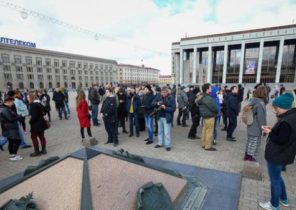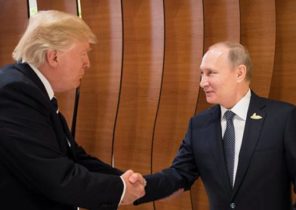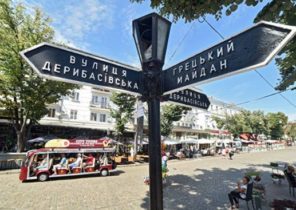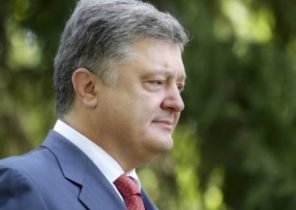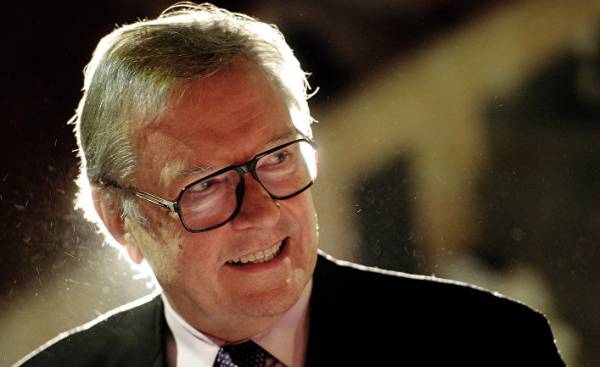
“It is absolutely untrue that we uncensored not able to do” — in an interview DELFI said, a classic of Polish cinema Krzysztof Zanussi, who visited Vilnius during the festival “Kinovisa” (Kino pavasaris).
Krzysztof Zanussi — famous Polish film and theatre Director, screenwriter and producer, winner of the main prize of the Venice film festival Golden lion, winner of many national and international awards. Director and to the honorary 77 years actively touring the world with lectures and film screenings, and last year staged in the Lithuanian Panevezys. Plans Zanussi is a new movie.
“In my opinion, Polish cinema is in good condition. A lot of interesting, significant works in recent years, and over the past 25 years. So it is absolutely untrue that we uncensored not able to do that in freedom, everything became worse. Such an opinion is expressed in the West, but it’s not,” says the author of more than 60 cinema and television films.
Zanussi confident that the process of revision of historical events and of personal responsibility in the countries of the former USSR is not yet complete. “In Lithuania there is still no repentance for communism, for their cooperation with the regime. In Lithuania, I see no discussion on this topic. In the Czech Republic, Poland it has been, was at least incomplete in Hungary. There are Nations that have done it — people who have done wrong, repented, and it was judges, prosecutors, professors, rectors. It was necessary, they said, “I am guilty,” said the Director.
Delfi: Lithuania in the framework of the festival “Kinovisa” you gave a lecture and presented his film “Illumination”, and the film Agnieszka Holland, the producer of which are, what are your impressions from the meetings with the audience?
Krzysztof Zanussi: It is necessary to ask viewers what their feelings (laughs). But for me, these meetings are always interesting — to meet our audience, to look at it from your perspective. I feel the same way, going through Lithuania. And at the moment I’m working on a new painting, which should be a joint production of Poland, Lithuania, Ukraine and Hungary. We start shooting in the summer. The picture will be called “Ether”, but it is my version of “Faust.” However, this line will be hidden and hope that at the end of the film the audience will understand that this refers to the myth of Faust. This myth is like outdated because people don’t believe that the soul exists, and a film about this — is it possible to sell your soul? I think that is possible.
— In Lithuania, by the way, recently visited the author of the film “Faust” by Alexander Sokurov. His work even was awarded the “Golden lion” at the Venice film festival. Somehow you are going to argue with him?
— I think not. I respect his picture, I saw it, but it is a different story, he’s the Supreme problem — the sale of soul. It is the time cut, so it’s a very rough against Goethe’s “Faust”.
— You mentioned that the new film will be joint production of several countries, and you think, is there a common cultural space of Poland, Lithuania, Ukraine?
To some extent, but there is a difference in the roots. I would say that this is a generic space belongs to Estonia, Finland, Lithuania, Poland. Not belong to Belarus, Ukraine, Bulgaria, Romania, because it is Eastern countries, and this is a different way of thinking. It’s a question of mentality, not the geography. I think that together we have lived the nightmare of war communism, we are still together. Because in the structure of society something is, there is a difference, one thing — those countries that have been incorporated, and the other those which have been satellites. The latter is more fortunate, they have suffered much less.
— Golden years of Polish cinema is marked by the works of such famous Directors as Andrzej Wajda, Krzysztof Kieslowski, Jerzy Hoffman, is also, of course, your creativity… do you think that Polish cinema right now is at what point in its development?
That is not for me to judge, is the work of film critics, but in my opinion, our cinema is in good condition. A lot of interesting, significant works in recent years, and over the past 25 years. So it is absolutely untrue that we uncensored not able to do that in freedom, everything became worse. Such an opinion is expressed in the West, but it is not. It is not true that the dog must be hungry in order to protect the owner. I keep dogs and I know that if a dog to feed, then it will be even better to protect you (laughs).
But to judge our movie is very difficult for me because I am part of it. With our classic, with twenty paintings, I travel around the world. Their selection was made by the Martin Scorsese, these paintings have been restored and this is very important because the paintings disappear. Fortunately, Poland has invested a lot of money — public money, restored a total of more than 100 of our classic movies. And twenty of them, I go for American, European, South American universities, I was also in Japan, and the recommendation of Martin Scorsese all very interested. About this collection very interesting he said that when he first arrived in the 70-ies, it is learned from the poles — is not as important as doing painting, why it should be done. And we try to think, why we do painting and what it serves.
— If you go to recent specific good examples, it is, of course, “IDA” Pawlikowski, which was even awarded the “Oscar”… Now in Lithuania, the Holocaust and historical justice very actively discussed and how it is relevant for Poland?
We also experienced. We admitted that we are not so innocent as I would like to think that there’s a part of the poles who helped Germans to kill Jews, but there’s also the part of the poles, which defended them, risking his life. There is one, and another, and the achieve proportion is now very difficult. Anti-Semitism in Poland there was, of course, and still exists. But there is a huge recognition of the value, which is the Jewish presence in our social life. So there’s one and another, but the fact that the poles have repented, it is very important.
But what I don’t see here in Lithuania: there is no more repentance for communism, for their cooperation with the regime. In Lithuania, I see no discussion on this topic. In the Czech Republic, Poland it has been, was not fully in Hungary. There are Nations that did, the people who have done wrong, repented, and it was judges, prosecutors, professors, rectors. And I had to say I’m sorry. In Poland this process has long passed and is going on. And he went, so that we feel that was the fault was, at least, a moral punishment. After all, how many of our citizens in all participated, others would do that.
Another recent Polish film, which echoes the theme of repentance is “Volyn”. Film hostility was adopted in Ukraine…
— The Volyn massacre is a very sensitive issue for the poles and Ukrainians, but that was to be. The picture is absolutely not biased, and I understand very well that in those circumstances, the spiritual, in which Ukraine is today, it is difficult to expect that she would confess to perfect. In this picture the poles admit that we, too, are largely to blame, that we for centuries provoked this hatred of Ukrainians. We pressed them, and it is in the picture shown. But it is the brutality of the war — its very difficult to accept. And I’m not surprised, because of them today, this threat, they are torn Donbass, it is a difficult time for pleading guilty, including against the Jewish minority. Ukraine today does not say. Maybe it’s not the time, but we, the poles, as we strongly support Ukraine, it was necessary to say that we know this and this is not forgotten.
— In 2014, your peers, Andrzej Wajda, in an interview with Delfi about his film “Katyn” said “all we expect is reconciliation”, and particularly stressed that “the idea of restoring the Empire of unacceptable.”
— Yes, we are looking for reconciliation, it is necessary. But on the other hand, it is clear that to defend the Empire, an anachronism. It means to admit that man lives in the past,not the future. Now a new Empire is Coca Cola, not those organisms that were in the XIX century. So — it’s underdevelopment.
— And the Russian Empire?
— And the Russian Empire is behind by 50 years from the developed countries, so these thoughts are there and appear. Why the French don’t want to rebuild their Empire? Or British? So it’s just an anachronism. Is not the time.
— And your films, and films Wajda in his time were United in a separate area which was called “Cinema of moral anxiety”. Is, in your opinion, Directors in Europe, and Russia, who have continued this tradition?
— Morality is always the basis of the story. We judge our actions, good or bad. So it’s not a movie of the same era, this drama is and Corneille, and Rossini, they were “moral concern” of their time. As for the Russian or European cinema, sometimes it reflects this trend, but rarely. Obviously this is not the main theme. Because in Europe there has been some destruction of values. And people already are afraid to condemn the actions of their ancestors, and, on the other hand, it is necessary, without it people can’t live better.
— You once made in defense of the Ukrainian Director Oleg Sentsov, on their support which from your well-known Russian colleagues expressed is that Alexander Sokurov… why do you think the Russian intelligentsia, which has always been opposition to the regime, now seem kind of quiet?
— I think this is a turning point, people still did not understand what was going on. They don’t see how this is all dangerous, if the law is not respected. And in this case there is every evidence that this was done illegally. Intellectuals must respond, without it she has no right to be respected, and without the intelligentsia, without the authority of the intelligentsia of the country does not have a guide. In fact it sets the benchmark. But I do remember that for centuries Russia had a strong intelligentsia, and it has always saved the country. And I hope that this time she will say it louder and what Sokurov is already very important to me. There are other decent people, regardless of what their possibilities are and how much they have courage.
— In Vilnius during the festival held a screening of your film “Illumination”. In the film there is a scene when a mathematician asks the main character, physics: “do You think reality is so important to her to mess around?” What do you think, is it important?
— Yes, I think, important. This is our reality, we live in it. But it is important that there is a world of ideas, and it should not be forgotten. Mathematics with the world meet daily.
— You once said that happiness is less important than the meaning, and the meaning for you as a philosopher, a creative person now what is?
— The meaning has always been the same — that the world is not built on chaos that this world is something is Yes. This world something is, and my life has some meaning in this world. I will remind you of gorgeous scenes from Fellini in “the Road” when Mato shows Gelsomina a small stone, and it becomes clear that even the stone has its value. That’s the whole point. And meaninglessness is chaos, that there is a cynicism, so that no value and all by accident. Where there is meaning, there is metaphysics, the feeling that there is some higher order that we cannot understand, but which intuitively feel. All religions are trying to develop this size, to approach him, but this person is not available. Now I see that the epoch of illumination, Illuminism, and it’s time to talk about dark age of Illuminism.
— That’s why You decided to go to “Faust”?
— Of course! Because what we see today, and physics tells us that the system of the world completely different than I thought after Newton: that was the end of determinism, which, for example, literature, art, and live still, with such principles that the explanation is that everything is predetermined is stupid. Today it has been proved that it is not, and after Einstein already can not speak.
— So you leave room for unpredictability, mystery… After all, the hero of your “Illuminations” make sure that it is possible to speak about concrete particles, matter, medicine, but you can’t know the mystery of love, life, death…
— The secret is most important. I myself keep saying. I like the main character of the film, there were times when I had gone to live in the temple, and it worked for me. And that’s why I reported this in the movie talk.
— Last year in Panevezys You staged “Hybris” what is it?
— In Panevezys put my play “Hybris”, although I created it at the invitation of the theatre in Saint-Petersburg. But as it turned out, in Saint-Petersburg in the current conditions to deliver such a performance impossible. Because he says that it is impossible to live, yet there is no repentance for sins. Here is a view of the Stalin era. And this, of course, for me, is always true. This generation is now dying. It’s the people, actions which were unacceptable, and among them there are those who will not repent. If you remember “Go”, then there is the heroine, the mother, the prototype of which is a solicitor that I personally knew, she just died in London. It was such a criminal person who to death did not want to admit that she is the innocent people sent to death. She admits that they were innocent, but said that it was a historical necessity to kill them. And it’s hard to live. This must be calculated and need to repent to be free from guilt. And without repentance will not release. And it must be done so that victims know about it.
— In the rehearsal, you are still invited actors to his country house?
— Movie this is not necessary, but drama is exactly what happens. After sitting a month in Panevezys me it would be difficult, and cute Lithuanian actors came to me, and I think we had a wonderful time.
— You wrote somewhere that your grandfather was born in Siberia and walked to Europe. How did this happen?
Is both truth and legend. Grandfather died when I was three years old. Mom know anything… He was born in a family of exiles in 1863, and we don’t even know where exactly in Siberia. His exiled parents died, and he, when he was 12 or 13, moved in the direction of Europe, walked. But he never wanted to talk, it’s time for him was a terrible ordeal.
— I would like to recall your friend Andrei Tarkovsky, who, on 4 April, would have turned 85 years old. Whatever it was, you think, in your 85?
— He would have been the same as always. And commented on their spiritual quest. And they would be enough for many paintings and if he were alive, I would still have a lot of movies. He was very solid, very tough man, full of contradictions, but he felt this enormous moral sense and self-evaluated critically. Two weeks before his death, he asked me when I visited him in Paris: “If I die, if you’re going to talk about me, always remind that I considered myself a sinful man”. And you see, the real criminals remain silent and not recognized, and people, in which there was so much light, you saw your flaws and wanted to remember this, to not make an idol out of it, in our memory he remained a normal person.
— Thank you for the interview.


